Search
Search Results
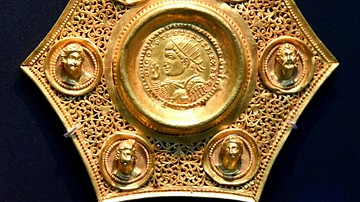
Image
Gold Coin Pendant of Constantine
Gold pendant set with a coin of Constantine the Great, c 320s CE. The British Museum, London. The pendant is made in a pierced metalwork technique popular in fine jewellery of the time. The obverse of the coin depicts a bust of Constantine...
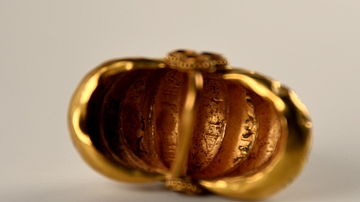
Image
Interior Cuneiform of Gold Earring, Ur III
The interior hollow surface of the earring. Note how the carved cuneiform signs appear on this side and how the goldsmith joined the “lunar-shaped” segments of the earring. One of a pair of gold earrings, 24 carats. Gift from Shulgi to a...
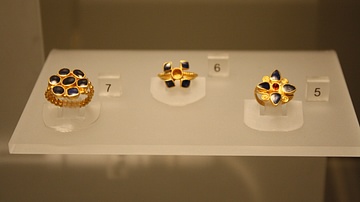
Image
Roman Gold & Saphire Rings
Roman gold and saphire rings, second half of the 2nd century CE. The ring on the right has a garnet centre stone. From an unidentified marble sarcophagus in Rome. (Palazzo Massimo, Rome)
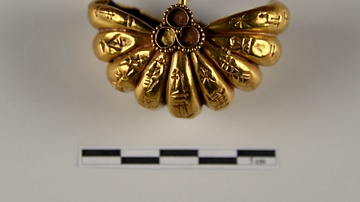
Image
Mesopotamian Gold Earring, Ur III
This is the upper surface of the earring . The right lower circle is broken and at the center of the trifoliate group lies a single golden sphere. The cuneiform text is read vertically, from the upper surface downwards on each segment, and...
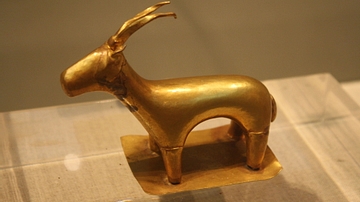
Image
Gold Ibex, Akrotiri
A gold ibex figurine from Akrotiri on Thera (Santorini), 17th century BCE. The figurine was discovered in 1999 CE in mint condition having been originally placed inside a wooden box within a clay chest. It is hollow and was made using the...

Image
Gold Stemmed Cup, Mycenae
A gold stemmed cup from Mycenae, often called the 'Cup of Nestor' following Homer's description. A dove rests on the top of each handle. 16th century BCE, Grave IV, Grave Circle A, Mycenae. (National Archaeological Museum, Athens)
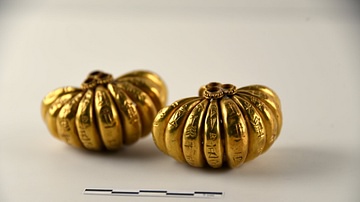
Image
Gold Earrings, Ur III, Mesopotamia
The convex and carved surfaces of the earrings. Each earring is composed of nine lunar-shaped segments forming a flattened half- ball. The cuneiform signs run vertically from above downward, starting from the right end. A pair of gold earrings...

Image
Persian Gold Daric
Gold daric from Persia, kingdom of Achaemenids, 5th-4th century BCE. O: King with bow and quiver. R: Incuse oblong.
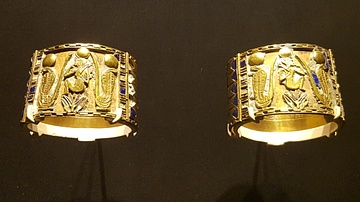
Image
Egyptian Gold Bracelets
Egyptian inlaid gold bracelets belonging to Prince Nimlot, one of the sons of Sheshonq I, the first king of the 22nd Dynasty. About 940 BCE. Said to be from Sa el-Haggar (Sais), Egypt. From The British Museum, (photo taken at The Powerhouse...
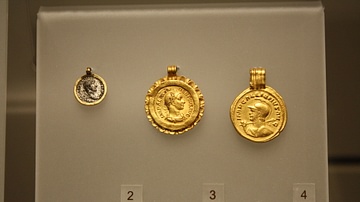
Image
Roman Gold Pendants
Roman gold pendants depicting various emperors. The far left pendant shows Hadrian (119-132 CE), the central shows Severus Alexander (222-235 CE), and the right example shows Gallienus as Mars (253-268 CE). (Palazzo Massimo, Rome)